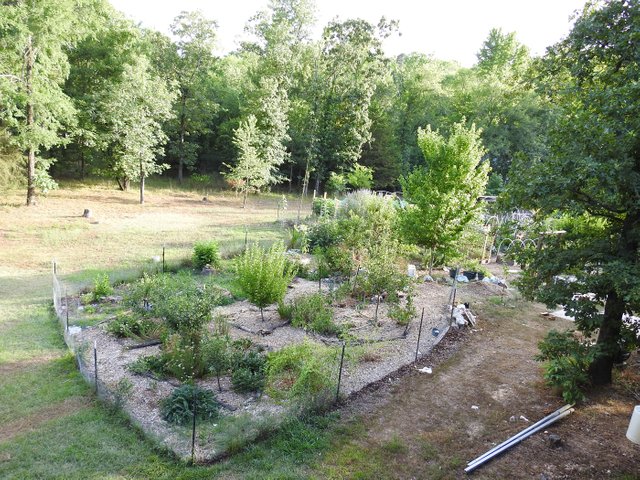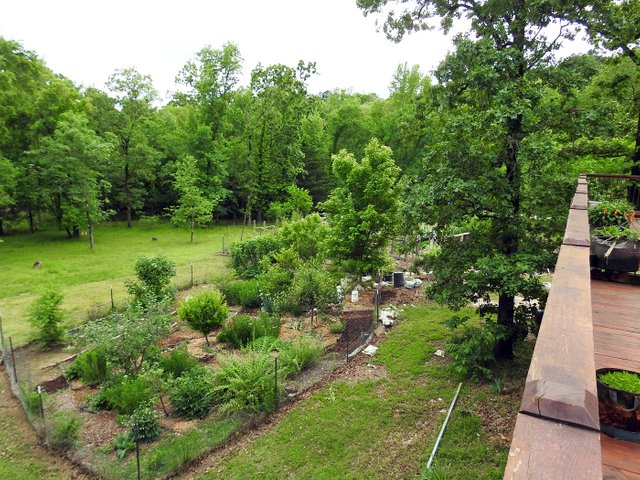Last year, we had a severe drought in the Spring. I have completely forgotten about that until I started reading my garden journals on Steemit from last year. This is one of the reasons I wanted to record our food forest progress on this platform. I learned from the first year of gardening that I should always be taking photos to keep track of where the plants are planted each year and to showcase the growth. On top of that just to remind ourselves why we work so hard.

I am amazed with how different our food forest and property look this year compare with last year. It's such a blessing when Mother Nature decides to give us plenty of wonderful rains this Spring. There is nothing that feeds and helps your food forest grow like natural rain fall. We have also had several thunder storms this year and with past experiences, we know thunder and lighting do wonders for our plants in the food forest. Lightning is known to be a major factor in naturally fertilizing plants, therefore giving your vegetable plants a quick boost of life. Cucumbers, tomatoes and melons can almost double in size when we have substantial rain that are accompanied by thunder and lighting. You will notice your plants looked brighter, greener, and fresher after a thunderstorm.
Air is comprised of 78% nitrogen and about 20% oxygen. Nitrogen is an element that plants need for chlorophyll production (which aids photosynthesis), foliage development, and overall growth. It is usually the main ingredient in fertilizers. However, the nitrogen in air is not in a usable form for most plants.
The intense heat and electric charges produced by lightning causes the nitrogen molecules in the air to cling to the oxygen molecules. This bond forms nitrogen oxides. The nitrogen oxides will either fall from the sky, or be collected by the rain drops – bringing a form of nitrogen that can now be used by the plants. The plants now receive a supercharged dose of available nitrogen, causing them to become brighter, healthier, and greener. source
The Two photos Below Compare the Difference of Our Food Forest Between Last Year and This Year
The first photo was taken in May of 2018 after a pretty severe drought in the Spring. You can see how brown and dry everything was. The second photo was taken in May of this year (2019). I think we have had rain weekly this Spring if not more. You can see how lush and green everything is.

This photo was taken Spring of 2018. We had a severe drought in the Spring of 2018.

This photo is taken Spring of this year. We have had a wet Spring in 2019.
I love this! TESIFY!!! Geez...the comparison in your photos...is amazing! I sure feel the LIFE....during and after the storms. Stormed alllll night here....and the forest and soil...are SINGING!!!!!!!!!! lol...it does looks like the cukes and melons doubled in size! Thank for this beautiful post sister!
Downvoting a post can decrease pending rewards and make it less visible. Common reasons:
Submit
I love all the Spring rains we are getting this year. I was shocked when I saw the difference in the photos myself. That's why I keep a photo journal of the food forest. We are about to get another round of rain tonight. Love it when the forest and soil sing !!!
Downvoting a post can decrease pending rewards and make it less visible. Common reasons:
Submit
Congratulations @thelaundrylady! You have completed the following achievement on the Steem blockchain and have been rewarded with new badge(s) :
You can view your badges on your Steem Board and compare to others on the Steem Ranking
If you no longer want to receive notifications, reply to this comment with the word
STOPTo support your work, I also upvoted your post!
Vote for @Steemitboard as a witness to get one more award and increased upvotes!
Downvoting a post can decrease pending rewards and make it less visible. Common reasons:
Submit